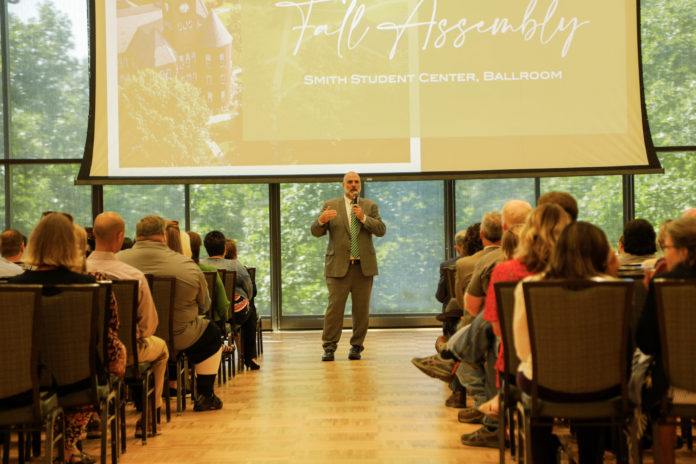Enrollment and finances dominated the fall assembly on Thursday where faculty and students discussed concerns about university affairs with administration.
SRU President William Behre and APSCUF President Jason Hilton hosted the fall assembly in the Smith Student Center ballroom and began with outlining the old and new allocation formulas with a possible worst-case scenario.
“When we were doing projections for this fall,” Behre said, “we had a realistic worst-case scenario that would have put us close to $10 million in deficit.”
The new appropriation formula, developed by the Pennsylvania legislature, adds $75 million more to the state system. A board that included Behre then divided that money among the 10 universities and 14 campuses in the system.
The result was an additional $9.7 million coming to SRU, which covered most of that worst-case $10 million-in-deficit scenario.
In this formula, 25% goes to fixed costs, and 75% is enrollment-driven. 20% of that 75% is driven by Pell Grant eligibility, underrepresented students, juniors, seniors and graduate students because they are generally more expensive to educate because of their smaller class size.
The old allocation formula had a larger part of fixed costs and a smaller percentage was enrollment-driven. At Behre’s first Board of Governors meeting four years ago, they decided “on the fly” to throw away that formula because schools were struggling to meet their budgets.
To make up the money, Behre said the state legislature “taxed us.”
“We dropped about $1 million,” he said, “West Chester dropped $3 million, Millersville dropped $1 million or so, and that’s what we were living with. We had an allocation formula that was subsidizing the schools that were struggling at the expense of the schools that were stronger.”
Overall enrollment has gone up 2.1%, according to WPXI, but the student population is still shrinking. Graduate enrollments are also down. If enrollment continues to decline, SRU will have to shrink their employment to match. However, Behre does not think that scenario will happen.
During the pandemic, administration made the conscious decision not to shrink the SRU workforce because they thought students would be more needy, and they didn’t want to cut employees’ health benefits.
Even with several hundred fewer students, the university payroll still increased due to contractual obligations.
Behre and his administration have taken these numbers and created a three-year projection.
“Next year,” he said, “there’s a modest deficit of about $1 million, which is a lot of money to you and me, but on a $150 million budget, that’s a rounding error.”
Behre said he is sure that as the picture becomes clearer, we can find other spending reallocations to cover that.
The second year was skipped over in the conversation.
The third-year average deficit is down to $300,000, which Behre said he is not worried about.
SRU has gone five years without any tuition increases or substantial fee increases. A 2% increase would be about $1.7 million, which would help bridge the gap. A tuition increase is possible for the third year of the projection.
Behre said SRU currently has the second lowest tuition and the best four year graduation rate.
“If you look at higher education,” he said, “we’re much better than most. However, we want to be successful relative to our ideals, not relative to our neighbors.”
Since Behre took office, SRU has spent approximately $27 million on bonds. Besides what they’ve already made promises for, the reserves has increased by $26 million.
Bonds have a call date, which is when they must be paid off. SRU bonds don’t have a call date until 2025, which gives the university time to build a strategy.
“In 2025, we can literally go to zero education in general debts, which takes $2.5 million off the bottom line,” Behre said.
Do that and we can pass those savings onto students and invest in our campus, he said.
SRU also has money sitting in the different departments’ reserves accounts, but that money has shrunk.
“We noticed a lot of departments were sweeping large chunks of their budgets in a given year,” he said, “which suggests they actually don’t need that budget when we review the budget reset.”
That centralizes the reserves, and we’re free to start paying down the balance, he said.
Behre doesn’t want to use reserves for ongoing expenses like payroll, but he would be willing to use reserves to pay for $27 million in bond debt. However, this is another worst-case scenario.
Behre also addressed the rumored “secret document” that dissects struggling programs; most of which are under-enrolled. The comprehensive planning process (CPP) document currently lists 14 programs but is expected to be reduced by half.
He admits that these conversations shouldn’t be easy, but believes that conversations to cut programs that don’t have any students in them must be had.
When determining the value of a program, the administration factors in how much it costs and its value to the university. Behre used the example that music is not profitable, but it is necessary for a strong university.
While these conversations are being had, other ways to save money involve absorbing other responsibilities and financial aid.
Instead of retrenchments, the university will be analyzing natural turnovers and asking if they can delegate those responsibilities to another position. SRU will do this with every position, except police officers, in which they will be hiring more of. Officer training to address students’ mental health is “pending.”
SRU also tends to give more financial aid than other schools. Behre wants to start a conversation about this, as we have been giving the same amount of financial aid to fewer students.








